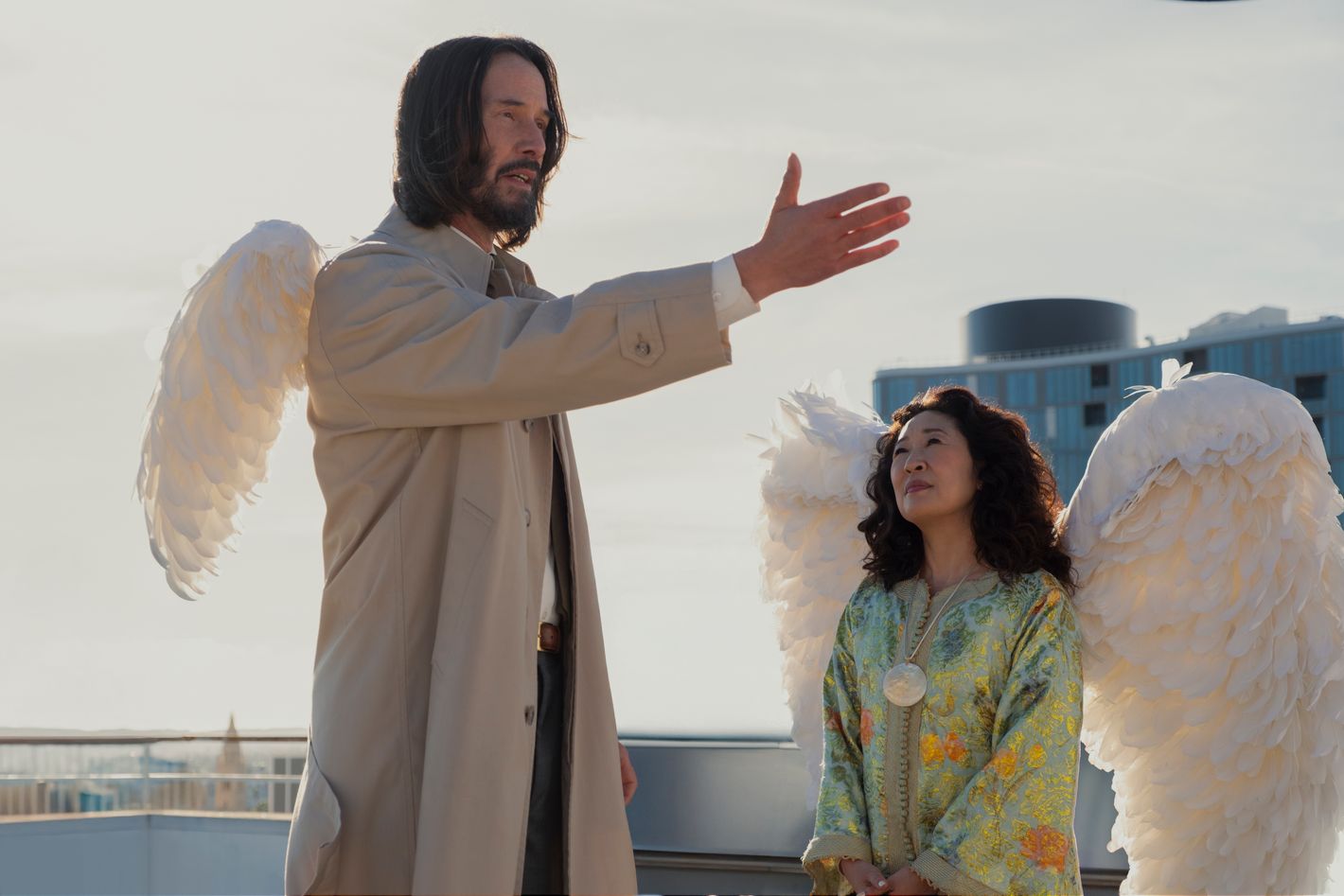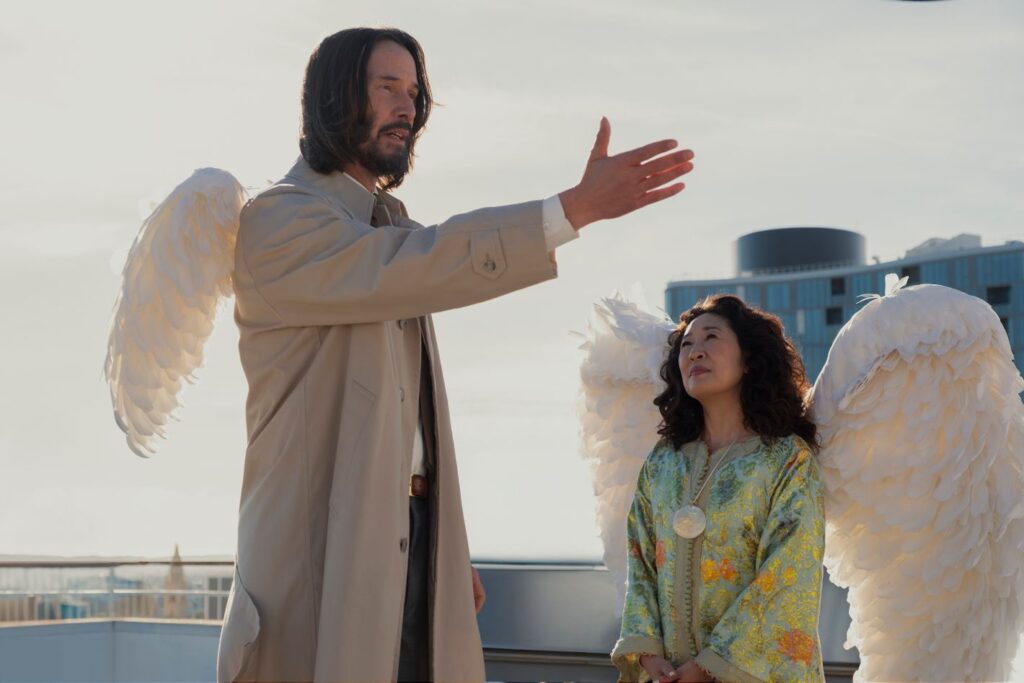
Every few years, Aziz Ansari learns about a new sociological phenomenon and funnels it into his work. In the mid 2010s, his fascination with modern dating trends informed large chunks of his stand-up material, his book Modern Romance: An Investigation, and season one of Master of None. His interest in aging fed into the closing joke of his 2017 special Live at Madison Square Garden, and would have been the inspiration for his 2022 directorial debut film, Being Mortal, if the film had not been scrapped following harassment complaints against star Bill Murray on set. Following that fiasco, Ansari began work on directing a new feature inspired by yet another sociological muse. Good Fortune, which premiered at the Toronto International Film Festival on September 6, is all about the gig economy.
Ansari plays Arj, a struggling documentary editor in L.A. who makes money by working part-time at a hardware store and a Taskrabbit-style company called “Task Sergeant,” where his tasks can range from waiting in line for people who want viral cinnamon buns to organizing messy garages. It’s grueling and demeaning work which leaves Arj subject to the whims of unforgiving clients who stiff him on payment for things that are outside of his control (the cinnamon buns run out before his turn in line.)
One of the people who hires Arj off the app is Jeff, a rich and stereotypical tech bro, played by Seth Rogen. Jeff has a gigantic house in the hills, a garage full of luxury cars he doesn’t know how to drive, and his own sauna and cold plunge which he uses ritualistically, despite confessing he has “no idea” if it offers any benefits. Arj spends a short stint working as Jeff’s assistant, but he’s fired for an honest mistake. This kicks off a series of events that ends with his car — which he’d been living out of because he can’t afford an apartment — getting towed.
That’s when Gabriel, played by Keanu Reeves, decides to intervene. Gabriel is a guardian angel who works in the “texting and driving” department of divine intervention. (Asked at one point how his work is going, he deadpans that it’s not going great: “People really love doing it.”) He’s been keeping an eye on Arj since he read a concerning text Arj wrote while driving about giving up on his life. Gabriel aspires for more fulfilling work, and against the orders of his boss (a higher-ranking angel played by Sandra Oh), takes it upon himself to try to save Arj’s lost soul by showing him that his life has meaning despite economic hardship. Gabriel swaps Arj and Jeff’s circumstances to show him that money alone won’t solve all his problems. The unsurprising twist: it instantly solves most of his problems, and Arj has no immediate desire to switch back.
This puts Jeff and Gabriel, who is demoted to being a human being by his boss for going against her orders, in a difficult spot. While Arj is off living the good life, the pair now have to scrape together enough money to survive, and the movie once again hammers home the injustices of the gig economy. Jeff begins working as a driver on a food delivery app, and he soon learns what it’s like to wait in line for exorbitant periods of time, get one-star reviews from unreasonable customers, compete with robot delivery carts, and lose money on his work because of the cost of gas. Like Arj, they quickly end up sleeping out of a car.
Repetition aside, Ansari finds laughs in these circumstances. He plays up the excesses of Arj’s new life; in one scene, Arj eats at a sushi restaurant where the fish is flown in every day and his dining companion (Matt Rogers) brags about the restaurant’s “very high carbon footprint.” He mines tragicomedy out of Jeff and Gabriel’s financial circumstances — in one scene, Gabriel encourages Jeff to “focus on some positives” about sleeping in their car. But the movie is at its best when it’s focused less on these well-trod ideas and more on Gabriel adjusting to his new life as a human being. Reeves, far and away the movie’s MVP, plays Gabriel with pitch-perfect golden retriever innocence, and he squeezes every bit of comedy out of the scenes where Gabriel eats a hamburger for the first time, surfs the internet for pictures of baby elephants, and unknowingly takes psychedelic mushrooms.
Eventually, however, even Gabriel’s innocence is beaten down by his life of destitution. He gets a job as a dishwasher, copes with the stress of it by indulging in vices, and laments his fall from grace. “I used to be a celestial being, now I’m a chain smoker,” he complains at one point. When Gabriel gets his first paycheck, he’s mortified to see the tax and social security deductions. It’s not enough money to live on, he realizes. He’s shocked to learn that his co-worker, Felipe, works three jobs at once to make ends meet. Perhaps the point Ansari is making is that this should be shocking to people, rather than an accepted part of life in modern America. That’s well-intentioned enough, but you don’t exactly need to be a scholar of the gig economy for it to resonate.
More From the 2025 Toronto International Film Festival
The comedian’s feature directorial debut makes a point about economic precarity in America that is well-intentioned, if a bit obvious.

































































